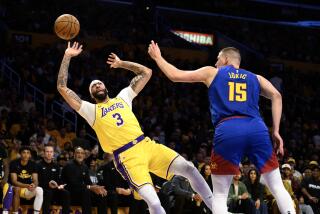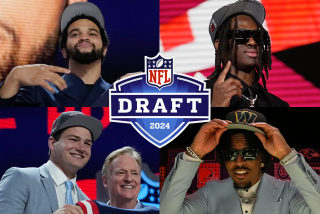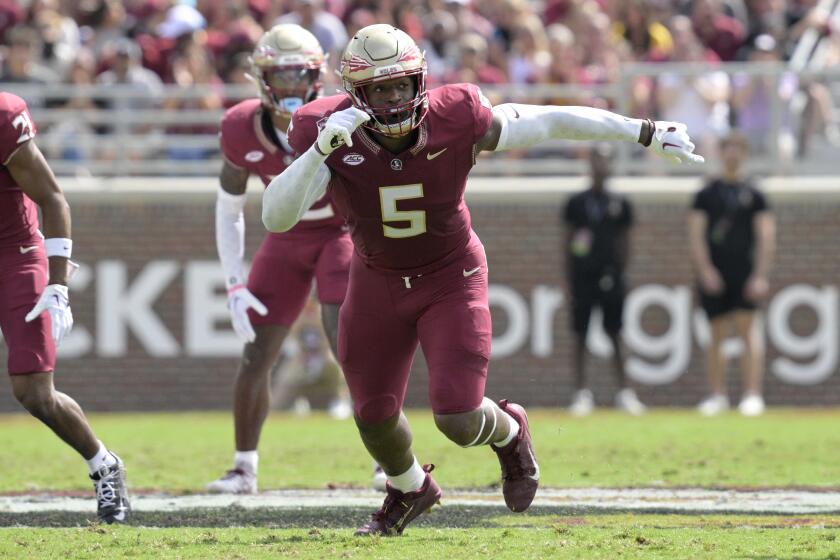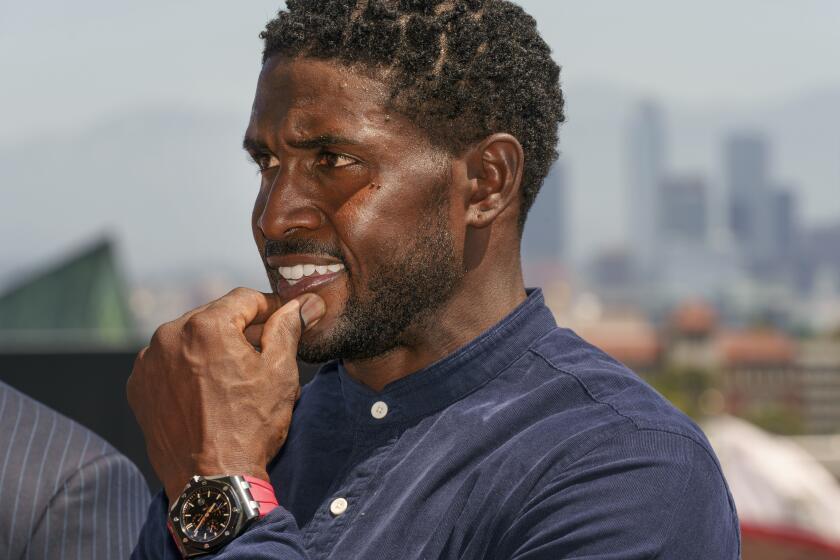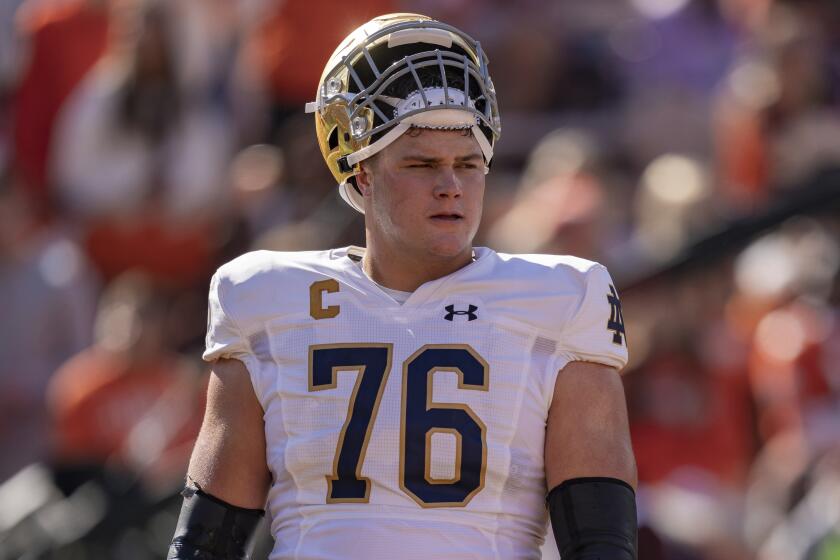HARD LESSONS
It came to Darnell Autry, once a star running back and a Heisman Trophy finalist, that life could offer more than working hotel security or making sure hardy partyers weren’t falling into the pool at a Las Vegas casino.
If only he had his college degree.
It occurred to Hudhaifa Ismaeli, once a star defensive back, that life could offer more than a place on the production line in a factory that made sewer pipes, or doing construction work.
If only he had his college degree.
Standouts in college, both among the key players on Northwestern’s improbable run 10 years ago to an outright 1995 Big Ten title and the 1996 Rose Bowl, neither Autry nor Ismaeli made it big in the NFL. Each had left Northwestern with about two years’ worth of college credits yet to be earned. And then their pro dreams were dashed.
Each, swallowing a heaping dose of pride, eventually went back to school, back to Northwestern, in Evanston, Ill., immediately north of Chicago, a demanding academic institution.
And now, each is poised to take part in graduation ceremonies in June. Autry will turn 30 three days after the ceremonies on June 16; Ismaeli will be pushing 31.
The football scholarships are long gone. Each has paid by himself or taken out loans to finish up -- no small matter at Northwestern, where tuition alone this year runs $31,644.
“When all is said and done, I’ll owe a great deal of money,” Autry said. “More money than I have now.”
When all is said and done, however, their graduations will underscore something more than money, the life lesson that 1995 season made plain:
If Northwestern can go to the Rose Bowl, then truly nothing in life is impossible.
“It’s not how life knocks you down,” Ismaeli said. “It’s how you rebound.”
*
Pat Fitzgerald, the starting middle linebacker on the 1995 Wildcat team, called Ismaeli “the best athlete I have ever been around.”
Fitzgerald, a two-time All-American and winner of several awards as the nation’s top defensive player in 1995, said of Ismaeli, “We pretty much built our defense around him.... I just got my name called because they blocked him a lot and that left me a chance to make a tackle.”
For Northwestern, the 1996 Rose Bowl was followed by the 1997 Citrus Bowl. But Ismaeli didn’t play in the Citrus Bowl, having been suspended from the football team for twice testing positive for marijuana.
Ismaeli disputed the second test, then declared for the NFL draft. The Miami Dolphins took him in the seventh round, the 203rd pick -- for all his talent, only a prospect.
Most 203rd picks don’t make it. Ismaeli didn’t.
“I had to redefine myself,” Ismaeli said. “All my life, it was: ‘Oh, that’s Hudhaifa, the football player.’ Even though I knew I was more than a football player, subconsciously that aspect stuck within my brain. And so that was one amazing hurdle.”
With nowhere else to go, he bounced back and forth between Chicago and his native Pittsburgh. He reenrolled at Northwestern, then dropped out of those first classes. He did odd jobs.
Then he began, in earnest, his journey toward graduation.
He still had, he said, about 2 1/2 years’ worth of classes to complete. It took him about seven.
Northwestern runs on a quarter system. Every quarter, Ismaeli figured, cost him about $15,000. Some quarters he would be working and taking no classes. Some quarters he would take one class. Others, two, maybe three.
Working on the sewer pipes, he said, gave him a sense of urgency.
“You’re around all these chemicals. You don’t know what these chemicals are doing to you,” he said. “I said to myself, ‘Hurry up and get your damn degree.’ ”
There were times, he said, when he would get to Evanston with no place to stay. He often hid at night in one of the university’s lecture halls, trying to avoid janitors and police.
One time, he said, he was in the journalism school building when a janitor discovered him.
“He said, ‘You can’t be there.’ I said, ‘I’m going to leave in a minute.’ I didn’t, so they called the police,” Ismaeli recalled.
“That was a humbling experience,” because when the officers arrived, “They were like, ‘I remember you. You played on the Rose Bowl team!’ I was like, ‘Yeah, that was me.’ ”
Still, he persevered.
“My parents instilled in me education as one of the means to succeed in life,” Ismaeli said.
” ... And, no, I was not going to another school. I said, ‘I refuse to.’ I told my dean, I told my academic advisors, I said, ‘If it takes me 20 years to graduate from Northwestern, I am going to graduate from Northwestern.’ ”
This month, Ismaeli took his last exam. His degree, he said, will be in education.
The day after the exam, he called Jerry Brown, the longtime secondary coach, himself a Northwestern grad. Brown said Ismaeli told him, “I’m finally a Northwestern graduate, Coach Brown. You said I could get it done, and eventually I did.”
Ismaeli says he’s not sure what’s next -- a career in teaching or business, perhaps. “Whatever you set your mind to you can accomplish. Straight up. Flat out,” he said softly.
*
In one of Autry’s first classes back in Evanston, the professor took roll. After class ended, another student approached Autry and said, “You’re Darnell Autry?! You know, I used to watch you when I was a kid.”
On the wall in the office of his faculty advisor, Debra Webster, is a framed magazine cover from the fall of 1995 -- featuring Autry. She’d had it up for years before he arrived one day in her office.
“I have nothing but admiration for him,” she said. “I think what he’s trying to do is just very difficult.”
Autry also left Northwestern after the Citrus Bowl. He played some with the Chicago Bears and then with the Philadelphia Eagles. And then he found himself out of football.
A theater major at Northwestern, he moved to Los Angeles and landed a few bit parts. He had a friend in Las Vegas and moved there in 2002.
He started as a doorman in a bar at Treasure Island. Then he worked as a lifeguard and as a hotel security agent where, as part of the job, he rode a bicycle through a parking garage.
Moving up, he was made a report writer -- writing up accidents involving customers. When the hotel created three “junior host” positions, he got one.
And then he realized, “The only chance I had of making real money or making big moves ... I had to go back to school.”
Carol Lunkenheimer, Northwestern’s dean of undergraduate admission, said any student in good standing upon leaving, as were Autry and Ismaeli, is welcomed back. So, last spring, Autry went back. He is living in graduate-student housing. He took four classes last spring, four in the summer, five this fall. He needs four more in the winter quarter, three in the spring and then a final few credits next summer, through an internship.
It’s hard work, he said: “There’s no underwater basket-weaving or bowling classes here at Northwestern. I’m getting Bs. I’m getting A’s.... I certainly am not going to get any Cs. That’s not going to happen.”
Autry will graduate, according to Webster, with a double major, in theater and in communication studies. Even though he will have an internship yet to finish, he will take part in graduation ceremonies in June.
And after that?
“Hopefully go and do big things and donate big bunches of money,” he said with a laugh.
“That’s how it goes. I can’t explain in words the amount of gratitude I have and how much support I have had since I’ve been here, and how everyone wants to see me succeed.
“I’ve still got the acting thing. I still think that’s where I’m going to make it happen. But, I want to be available to all things.
“And,” he said, “I’ll have the degree to back me up.”
More to Read
Get our high school sports newsletter
Prep Rally is devoted to the SoCal high school sports experience, bringing you scores, stories and a behind-the-scenes look at what makes prep sports so popular.
You may occasionally receive promotional content from the Los Angeles Times.
